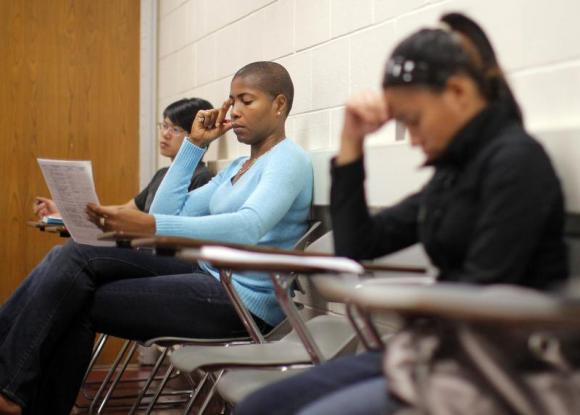(Reuters) – First generation college students get lower grades and are more likely to drop out – an achievement gap that threatens efforts to boost the number of college graduates.

Recent research, however, suggests a simple one-hour intervention that focuses on students’ social-class backgrounds could help close the divide.
In an experiment at an unnamed elite private college, incoming students listened to college juniors and seniors discuss how their social class backgrounds affected their college experience, according to the paper Closing the Social Class Achievement Gap, to be published in Psychological Science. The attendees and the panelists were a mix of first generation students — those whose parents lacked college degrees — and continuing generation students whose parents had college educations.
The first-generation students who attended this diversity education panel subsequently earned higher grades and were more likely to use campus resources such as tutoring than first-generation students who attended a panel about adjusting to college life that didn’t include the panelists’ stories about social class background, the researchers found.
In fact, the achievement gap between first generation students who attended the diversity panel and their continuing-generation peers shrank by 63 percent, according to researchers Nicole M. Stephens, associate professor of management and organizations at the Kellogg School of Management at Northwestern University; MarYam G. Hamedani, associate director of the Center for Comparative Studies in Race and Ethnicity at Stanford University; and Mesmin Destin, assistant professor of psychology at Northwestern University.
The older students’ stories were meant to communicate to the incoming students that there were others like them at the school, that people from different backgrounds needed to adopt strategies for success tied to those backgrounds and that difference is a normal part of college education, Stephens said.
When talking about making the transition to college, for example, one continuing-generation panelist said it was hard to adjust to more rigorous academics and leaving family, while a first-generation panelist talked about how exhausting it was pretending everything was fine.
I didn’t want people to see me struggling with the novelty of college or thinking that anything was wrong, the panelist said. Putting up such a front when I was overwhelmed by a new city, new difficult classes, making new friends was beyond hard.
The diversity panel also had benefits for the continuing-generation students. Both first-generation and continuing-generation students reported less stress and anxiety, better adjustment to college life, more social engagement, and increased recognition of multiple perspectives.
First-generation students often come from less affluent backgrounds and may struggle with the middle class environment of college, Stephens said. (In fact, six out of 10 of the first-generation students in the study received Pell Grants, federal aid for the neediest families, compared to fewer than one in 10 of the continuing education students.)
Middle-class and upper-class students know that asking for help is what it takes to succeed, Stephens said. Lower-class students might think they have to figure it out on their own.
Part of the problem, Stephens said, is that Americans typically are uncomfortable talking about class differences. That may be changing on college campuses, however. Stephens said she has noticed more efforts to discuss class issues in recent years. Groups at Stanford, the University of Chicago, MIT and Northwestern have launched websites and programs to discuss economic differences.
The Obama administration has made boosting the number of college graduates a priority, noting in a White House report called Increasing College Opportunity for Low-Income Students that college degrees dramatically improve the chances of economic success. But first-generation students are far less likely to complete their educations than those whose parents have degrees, according to the National Center for Education Statistics. It’s a gap that persists even when researchers control for cognitive ability, Stephens said.
Most university efforts to improve graduation rates for first-generation students focus on improving academic skills and providing sufficient financial support, Stephens said. Those efforts are necessary but not sufficient, she said.
In addition to needing financial resources and academic skills, students also need to learn how to navigate and overcome the cultural obstacles that they often experience in university settings, Stephens said.
Otherwise, she said, they could incorrectly infer ‘You’re not going to fit in, you don’t have what it takes, you’re not going to do well here.’
(The author is a Reuters columnist. The opinions expressed are her own.)
(Editing by Beth Pinsker and Phil Berlowitz)





